- Home
- L. M. Montgomery
Anne of Green Gables (Penguin)
Anne of Green Gables (Penguin) Read online
Contents
1. Mrs Rachel Lynde is Surprised
2. Matthew Cuthbert is Surprised
3. Marilla Cuthbert is Surprised
4. Morning at Green Gables
5. Anne’s History
6. Marilla makes up her Mind
7. Anne says her Prayers
8. Anne’s Bringing-up is Begun
9. Mrs Rachel Lynde is Properly Horrified
10. Anne’s Apology
11. Anne’s Impressions of Sunday School
12. A Solemn Vow and Promise
13. The Delights of Anticipation
14. Anne’s Confession
15. A Tempest in the School Teapot
16. Diana is Invited to Tea, with Tragic Results
17. A New Interest in Life
18. Anne to the Rescue
19. A Concert, a Catastrophe, and a Confession
20. A Good Imagination Gone Wrong
21. A New Departure in Flavourings
22. Anne is Invited Out to Tea
23. Anne comes to Grief in an Affair of Honour
24. Miss Stacy and her Pupils get up a Concert
25. Matthew insists on Puffed Sleeves
26. The Story Club is Formed
27. Vanity and Vexation of Spirit
28. An Unfortunate Lily Maid
29. An Epoch in Anne’s Life
30. The Queen’s Class is Organized
31. Where the Brook and River Meet
32. The Pass List is Out
33. The Hotel Concert
34. A Queen’s Girl
35. The Winter at Queen’s
36. The Glory and the Dream
37. The Reaper whose Name is Death
38. The Bend in the Road
The good stars met in your horoscope,
Made you of spirit and fire and dew.
BROWNING
‘Well,’ said Marilla, unable to find any excusefor deferring her explanation longer, ‘I suppose I might as well tell you. Matthew and I have decided to keep you – that is, if you will try to be a good little girl and show yourself grateful. Why, child, whatever is the matter?’
‘I’m crying,’ said Anne in a tone of bewilderment. ‘I can’t think why. I’m as glad as glad can be.’
Introduction by Lauren Child
‘Oh, it seems so wonderful that I’m going to live with you and belong to you. I’ve never belonged to anybody — not really.’
To return any child to a grim life in a lonely orphanage would be a hard thing to do, but eleven-year-old Anne Shirley is so disarmingly herself that you feel you know her within minutes, and to let her go would be impossible. It is no wonder Matthew and Marilla Cuthbert really don’t have the heart to swap her for the farm boy they requested and very much need.
The most charming thing about Anne is that even in her most ‘tragical’ moments (as she would put it) humour seems to spill out of her. How can you not love someone who has grown up without the benefit of sophisticated surroundings but recognizes the elegance that the letter ‘e’ can lend to a plain, sensible name like Ann? ‘A-N-N looks dreadful, but A-N-N-E looks so much more distinguished. If you’ll only call me Anne spelled with an e I shall try to reconcile myself to not being called Cordelia.’
When I was a child I was utterly in tune with Anne’s romantic notions — her longing for a kindred spirit and, as she puts it, ‘bosom friend’, her ability to dramatize every major and minor tragedy (‘My life is a perfect graveyard of buried hopes’), the haughty way she rebuffs Gilbert Blythe, the most popular boy in the school. To bash a slate over his head might seem most unwise, yet how right she is since from that moment on he is completely under her spell — a lesson I wish I had taken note of.
How did she manage to be so much herself? I had no idea, but to read about such a girl was liberating indeed, even if I found it impossible to follow her lead.
It is Anne’s imagination that has helped her survive neglect and loneliness. It not only protects her but it also enriches others and draws people to her. The world does seem a more alluring place when seen through Anne’s eyes; however, Anne has no delusions — she is very aware of the distinction between truth and fiction, and I think this is why one really believes in her.
For a book which is so full of romance and so richly imagined, the writing is astonishingly pared down. The genius of Lucy Montgomery’s creation is that she gives the illusion of having simply turned her pages over to the characters. We feel as if we are entering Anne’s world, rather than a world the author has created for her. The result could be quite sugary, but it isn’t — this is due to the lovely balance between Anne’s rambling romantic speeches and plain-talking Marilla’s short sharp retorts.
Returning to the book as an adult, I see all that I loved, but wrapped in something far more profound than my eleven-year-old self could have fully understood. Anne of Green Gables contains so many beautifully simple truths. Maybe because these truths are spoken by a young girl, often in response to the advice of an adult, they seem all the more poignant.
Perhaps my favourite thought in the book — certainly the one that resonates with me most — is the passage where Anne talks of longing to have a dress with puffed sleeves, a desire which, of course, Marilla will not even entertain. Anne declares that she will just imagine that her dress has puffed sleeves, which works very well until she arrives at Sunday school. ‘They all had puffed sleeves. I tried to imagine mine were puffed, too, but I couldn’t. Why couldn’t I? It was easy as could be to imagine they were puffed when I was alone in the east gable, but it was awfully hard there among the others who had really truly puffs.’
How true this is. How many times have I used my imagination to perfect my world, only to watch it dissolve when faced with the reality of the external world. Lucy Montgomery’s writing makes me feel a little like this. The elegant simplicity and economy of her style is something I can only aspire to.
1
Mrs Rachel Lynde is Surprised
Mrs Rachel Lynde lived just where the Avonlea main road dipped down into a little hollow, fringed with alders and ladies’ eardrops, and traversed by a brook that had its source away back in the woods of the old Cuthbert place; it was reputed to be an intricate, headlong brook in its earlier course through those woods, with dark secrets of pool and cascade; but by the time it reached Lynde’s Hollow it was a quiet, well-conducted little stream, for not even a brook could run past Mrs Rachel Lynde’s door without due regard for decency and decorum; it probably was conscious that Mrs Rachel was sitting at her window, keeping a sharp eye on everything that passed, from brooks and children up, and that if she noticed anything odd or out of place she would never rest until she had ferreted out the whys and wherefores thereof.
There are plenty of people, in Avonlea and out of it, who can attend closely to their neighbours’ business by dint of neglecting their own; but Mrs Rachel Lynde was one of those capable creatures who can manage their own concerns and those of other folks into the bargain. She was a notable housewife; her work was always done and well done; she ‘ran’ the Sewing Circle, helped run the Sunday-school, and was the strongest prop of the Church Aid Society and Foreign Missions Auxiliary. Yet with all this Mrs Rachel found abundant time to sit for hours at her kitchen window, knitting ‘cotton warp’ quilts — she had knitted sixteen of them, as Avonlea housekeepers were wont to tell in awed voices — and keeping a sharp eye on the main road that crossed the hollow and wound up the steep red hill beyond. Since Avonlea occupied a little triangular peninsula jutting out into the Gulf of St Lawrence, with water on two sides of it, anybody who went out of it or into it had to pass over that hill road and so run the unseen gauntlet of Mrs
Rachel’s all-seeing eye.
She was sitting there one afternoon in early June. The sun was coming in at the window warm and bright; the orchard on the slope below the house was in a bridal flush of pinky-white bloom, hummed over by a myriad of bees. Thomas Lynde — a meek little man whom Avonlea people called ‘Rachel Lynde’s husband’ — was sowing his late turnip seed on the hill field beyond the barn; and Matthew Cuthbert ought to have been sowing his on the big red brook field away over by Green Gables. Mrs Rachel knew that he ought because she had heard him tell Peter Morrison the evening before in William J. Blair’s store over at Carmody that he meant to sow his turnip seed the next afternoon. Peter had asked him, of course, for Matthew Cuthbert had never been known to volunteer information about anything in his whole life.
And yet here was Matthew Cuthbert, at half past three on the afternoon of a busy day, placidly driving over the hollow and up the hill; moreover, he wore a white collar and his best suit of clothes, which was plain proof that he was going out of Avonlea; and he had the buggy and the sorrel mare, which betokened that he was going a considerable distance. Now where was Matthew Cuthbert going, and why was he going there?
Had it been any other man in Avonlea, Mrs Rachel, deftly putting this and that together, might have given a pretty good guess as to both questions. But Matthew so rarely went from home that it must be something pressing and unusual which was taking him; he was the shyest man alive and hated to have to go among strangers or to any place where he might have to talk. Matthew, dressed up with a white collar and driving in a buggy, was something that didn’t happen often. Mrs Rachel, ponder as she might, could make nothing of it, and her afternoon’s enjoyment was spoiled.
‘I’ll just step over to Green Gables after tea and find out from Marilla where he’s gone and why,’ the worthy woman finally concluded. ‘He doesn’t generally go to town this time of year and he never visits; if he’d run out of turnip seed he wouldn’t dress up and take the buggy to go for more; he wasn’t driving fast enough to be going for a doctor. Yet something must have happened since last night to start him off. I’m clean puzzled, that’s what, and I won’t know a minute’s peace of mind or conscience until I know what has taken Matthew Cuthbert out of Avonlea today.’
Accordingly, after tea Mrs Rachel set out; she had not far to go; the big, rambling, orchard-embowered house where the Cuthberts lived was a scant quarter of a mile up the road from Lynde’s Hollow. To be sure, the long lane made it a good deal farther. Matthew Cuthbert’s father, as shy and silent as his son after him, had got as far away as he possibly could from his fellow-men without actually retreating into the woods when he founded his homestead. Green Gables was built at the farthest edge of his cleared land, and there it was to this day, barely visible from the main road along which all the other Avonlea houses were so sociably situated. Mrs Rachel Lynde did not call living in such a place living at all.
‘It’s just staying, that’s what,’ she said, as she stepped along the deep-rutted, grassy lane bordered with wild rose bushes. ‘It’s no wonder Matthew and Marilla are both a little odd, living away back here by themselves. Trees aren’t much company, though dear knows if they were there’d be enough of them. I’d rather look at people. To be sure, they seem contented enough; but then, I suppose, they’re used to it. A body can get used to anything, even to being hanged, as the Irishman said.’
With this Mrs Rachel stepped out of the lane into the backyard of Green Gables. Very green and neat and precise was that yard, set about on one side with great patriarchal willows and on the other with prim Lombardies. Not a stray stick nor stone was to be seen, for Mrs Rachel would have seen it if there had been. Privately she was of the opinion that Marilla Cuthbert swept that yard as often as she swept her house. One could have eaten a meal off the ground without overbrimming the proverbial peck of dirt.
Mrs Rachel rapped smartly at the kitchen door and stepped in when bidden to do so. The kitchen at Green Gables was a cheerful apartment — or would have been cheerful if it had not been so painfully clean as to give it something of the appearance of an unused parlour. Its windows looked east and west; through the west one, looking out on the back yard, came a flood of mellow June sunlight; but the east one, whence you got a glimpse of the bloom-white cherry-trees in the left orchard and nodding, slender birches down in the hollow by the brook, was greened over by a tangle of vines. Here sat Marilla Cuthbert when she sat at all, always slightly distrustful of sunshine, which seemed to her too dancing and irresponsible a thing for a world which was meant to be taken seriously; and here she sat now, knitting, and the table behind her was laid for supper.
Mrs Rachel, before she had fairly closed the door, had taken mental note of everything that was on that table. There were three plates laid, so that Marilla must be expecting someone home with Matthew to tea; but the dishes were everyday dishes and there was only crab-apple preserves and one kind of cake, so that the expected company could not be any particular company. Yet what of Matthew’s white collar and the sorrel mare? Mrs Rachel was getting fairly dizzy with this unusual mystery about quiet, unmysterious Green Gables.
‘Good evening, Rachel,’ Marilla said briskly. ‘This is a real fine evening, isn’t it? Won’t you sit down? How are all your folks?’
Something that for lack of any other name might be called friendship existed and always had existed between Marilla Cuthbert and Mrs Rachel, in spite of — or perhaps because of — their dissimilarity.
Marilla was a tall, thin woman, with angles and without curves; her dark hair showed some grey streaks and was always twisted up in a hard little knot behind with two wire hairpins stuck aggressively through it. She looked like a woman of narrow experience and rigid conscience, which she was; but there was a saving something about her mouth which, if it had been ever so slightly developed, might have been considered indicative of a sense of humour.
‘We’re all pretty well,’ said Mrs Rachel. ‘I was kind of afraid you weren’t, though, when I saw Matthew starting off today. I thought maybe he was going to the doctor’s.’
Marilla’s lips twitched understandingly. She had expected Mrs Rachel up; she had known that the sight of Matthew jaunting off so unaccountably would be too much for her neighbour’s curiosity.
‘Oh, no, I’m quite well, although I had a bad headache yesterday,’ she said. ‘Matthew went to Bright River. We’re getting a little boy from an orphan asylum in Nova Scotia, and he’s coming on the train tonight.’
If Marilla had said that Matthew had gone to Bright River to meet a kangaroo from Australia Mrs Rachel could not have been more astonished. She was actually stricken dumb for five seconds. It was unsupposable that Marilla was making fun of her, but Mrs Rachel was almost forced to suppose it.
‘Are you in earnest, Marilla?’ she demanded when voice returned to her.
‘Yes, of course,’ said Marilla, as if getting boys from orphan asylums in Nova Scotia were part of the usual spring work on any well-regulated Avonlea farm instead of being an unheard-of innovation.
Mrs Rachel felt that she had received a severe mental jolt. She thought in exclamation points. A boy! Marilla and Matthew Cuthbert of all people adopting a boy! From an orphan asylum! Well, the world was certainly turning upside down! She would be surprised at nothing after this! Nothing!
‘What on earth put such a notion into your head?’ she demanded disapprovingly.
This had been done without her advice being asked, and must perforce be disapproved.
‘Well, we’ve been thinking about it for some time — all winter in fact,’ returned Marilla. ‘Mrs Alexander Spencer was up here one day before Christmas and she said she was going to get a little girl from the asylum over in Hopetown in the spring. Her cousin lives there and Mrs Spencer has visited her and knows all about it. So Matthew and I have talked it over off and on ever since. We thought we’d get a boy. Matthew is getting up in years, you know — he’s sixty — and he isn’t so spry as he once was. His heart troubles
him a good deal And you know how desperate hard it’s got to be to get hired help. There’s never anybody to be had but those stupid, half-grown little French boys, and as soon as you do get one broke into your ways and taught something he’s up and off to the lobster canneries or the States. At first Matthew suggested getting a “Home” boy. But I said “no” flat to that. “They may be all right — I’m not saying they’re not — but no London street arabs for me,” I said. “Give me a native born at least. There’ll be a risk, no matter who we get. But I’ll feel easier in my mind and sleep sounder at nights if we get a born Canadian.” So in the end we decided to ask Mrs Spencer to pick us out one when she went over to get her little girl. We heard last week she was going, so we sent her word by Richard Spencer’s folks at Carmody to bring us a smart, likely boy of about ten or eleven. We decided that would be the best age — old enough to be of some use in doing chores right off and young enough to be trained up proper. We mean to give him a good home and schooling. We had a telegram from Mrs Alexander Spencer today — the mail-man brought it from the station — saying they were coming on the five-thirty train tonight. So Matthew went to Bright River to meet him. Mrs Spencer will drop him off there. Of course she goes on to White Sands station herself.’
Mrs Rachel prided herself on always speaking her mind; she proceeded to speak it now, having adjusted her mental attitude to this amazing piece of news.
‘Well, Marilla, I’ll just tell you plain that I think you’re doing a mighty foolish thing — a risky thing, that’s what. You don’t know what you’re getting. You’re bringing a strange child into your house and home, and you don’t know a single thing about him not what his disposition is like nor what sort of parents he had nor how he’s likely to turn out. Why, it was only last week I read in the paper how a man and his wife up west of the Island took a boy out of an orphan asylum and he set fire to the house at night — set it on purpose, Marilla — and nearly burnt them to a crisp in their beds. And I know another case where an adopted boy used to suck the eggs — they couldn’t break him of it. If you had asked my advice in the matter — which you didn’t do, Marilla — I’d have said for mercy’s sake not to think of such a thing, that’s what.’

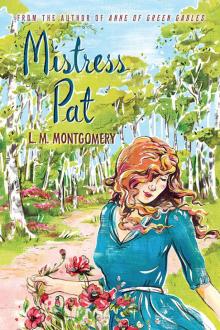 Mistress Pat
Mistress Pat A Tangled Web
A Tangled Web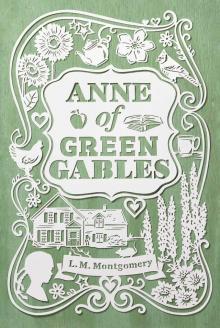 Anne of Green Gables
Anne of Green Gables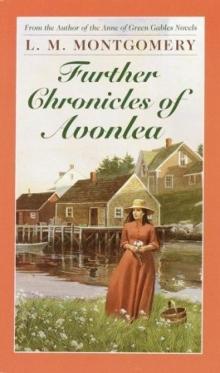 Further Chronicles of Avonlea
Further Chronicles of Avonlea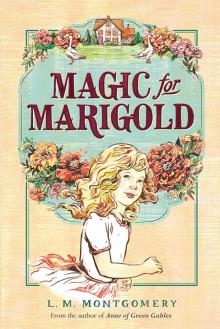 Magic for Marigold
Magic for Marigold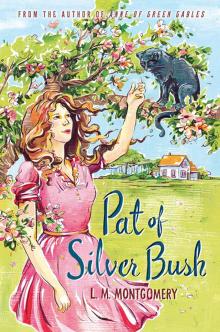 Pat of Silver Bush
Pat of Silver Bush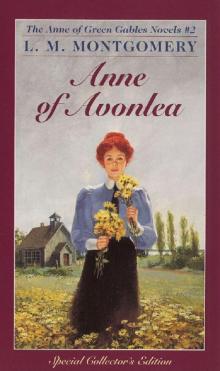 Anne of Avonlea
Anne of Avonlea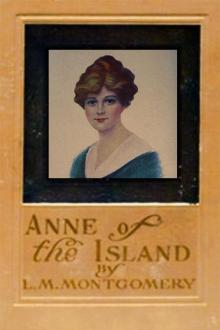 Anne of the Island
Anne of the Island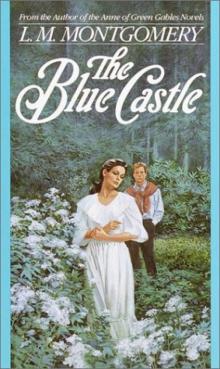 The Blue Castle
The Blue Castle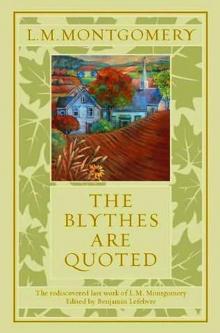 The Blythes Are Quoted
The Blythes Are Quoted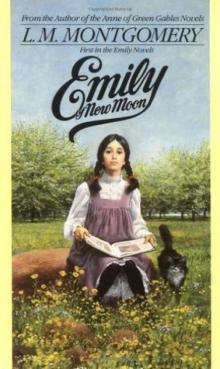 Emily of New Moon
Emily of New Moon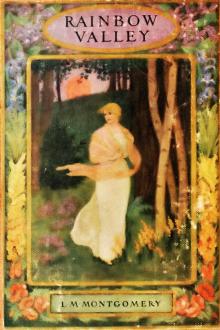 Rainbow Valley
Rainbow Valley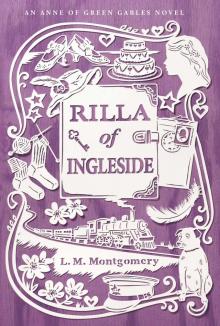 Rilla of Ingleside
Rilla of Ingleside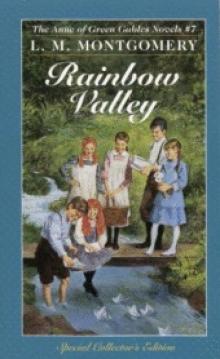 07 - Rainbow Valley
07 - Rainbow Valley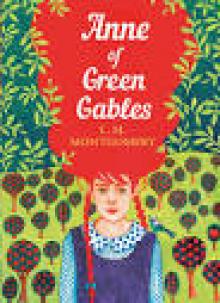 Anne of Green Gables (Penguin)
Anne of Green Gables (Penguin)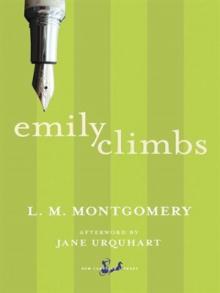 Emily Climbs
Emily Climbs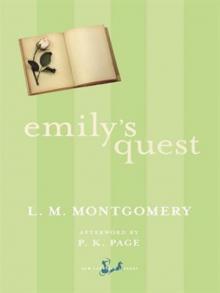 Emily's Quest
Emily's Quest A Name for Herself
A Name for Herself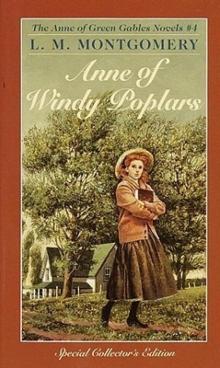 Anne of Windy Poplars
Anne of Windy Poplars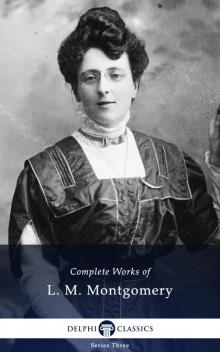 The Complete Works of L M Montgomery
The Complete Works of L M Montgomery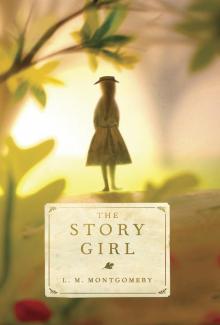 The Story Girl
The Story Girl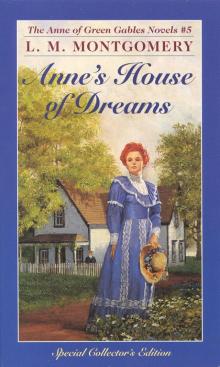 Anne's House of Dreams
Anne's House of Dreams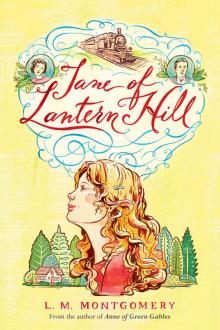 Jane of Lantern Hill
Jane of Lantern Hill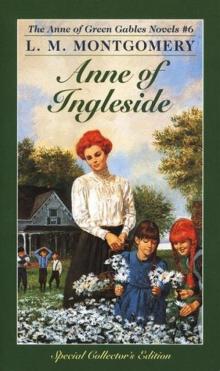 Anne of Ingleside
Anne of Ingleside